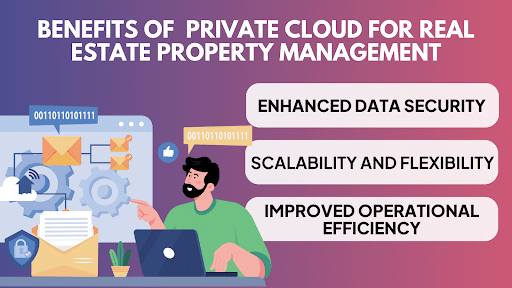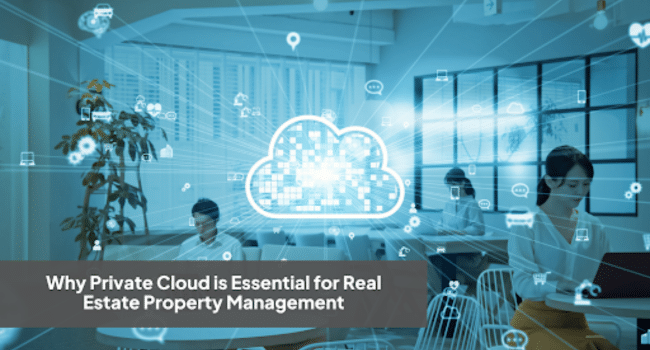Table of Contents
As increased dynamics in property management practice continue to redesign the future of work, technology remains a dominant factor in enabling operation efficiency, effectiveness, and data storage protection. Among the latest technological advancements that have emerged to gain prime importance are the private clouds.
Although public clouds offer general solutions, private clouds provide tailored benefits critical for real estate property management. This article discusses why property management firms need to embrace private clouds and how this technology can transform their operations.
Data Security and Privacy
Safeguarding the data a property management firm holds is most critical for them.
Property managers are responsible for sensitive information such as tenant data, leases, finances, and maintenance requests. Thus, a private cloud contact center solutions is much more secure, since it places all the data in one dedicated server exclusively hosting data for one organization.
This means property management firms can also institute customized security protocols, like advanced encryption, multi-factor authentication access, and highly strict access controls.
With the use of a private cloud, property managers can reduce the possibility of data breaches and its access through unauthorized persons, thus building tenants’ confidence and conforming to laws like GDPR or CCPA.
Such an environment ensures that no data leaving this controlled and guaranteed perimeter will be sensitive, bringing contentment and peace of mind, both for property managers and tenants.
Scalability and Flexibility
The real estate industry is a dynamic sector with varying needs based on market conditions, property acquisition, and operational requirements. A private cloud helps property management companies scale their resources according to demand.
A private cloud allows property management firms to scale their resources appropriately, which would not have been possible if they maintained their own on-premises infrastructure type which requires large capital investments and time to scale.
For a property management firm acquiring new properties or expanding its portfolio, scaling IT resources up or down can be easily done without the need for additional hardware. This will ensure that firms can handle increased data storage, processing power, and application demands without any performance compromise.
Furthermore, the flexibility of a private cloud empowers property managers to deploy and integrate new applications and technologies at ease, thereby better equipping them to be competitive in the marketplace.
Improved Operational Efficiency
Operational effectiveness is the success mantra in the domain of property management, where there could be more joints between tenants’ communication, scheduling of maintenance, and financial reporting. Private clouds can greatly enhance operational effectiveness by centralizing data and applications on a single platform.
For example, private clouds often come with advanced management tools and automated routine tasks. For example, private cloud-based property management software can automate lease renewals, collection of rents, and maintenance requests, thus relieving the staff of a plethora of administrative tasks.
Such automation leads to increased accuracy and time savings in operations for a property manager, so this time can be better utilized in strategic and tenant satisfaction activities.
Customization and Integration
Public clouds, unlike private ones, support the cookie-cutter solutions one finds in most of the market space, while private clouds can be designed around the needs of an organization to support extremely specialized applications and workflows.
For example, a property management firm may want to integrate complex lease agreements with various accounting systems or manage property-specific data within the existing infrastructure. This is possible within a private cloud environment without the limitations found in public clouds.
The system can also easily integrate with the existing systems and popular third-party applications, so the overall property management process stays consistent and effective.
Regulatory Compliance
There are so many laws in the real estate industry today, such as the law on data protection, which need to be complied with, and the laws of financial reporting, as well as conducting fair housing procedures. A private cloud offers a contained environment that can be tailored to meet these regulatory standards.
For example, a private cloud can be configured to meet specific data retention policies, audit trails, and reporting requirements. In this manner, a property manager can be securely compliant within those set regulations of the industry without, of course, having many legal entanglements.
Secondly, there is generally an element from private cloud providers that will support compliance-related audits and certifications, which will help property management firms remain compliant within their compliance obligations.
Cost Efficiency
While the up-front cost for a private cloud is definitely going to be more than that for public cloud offerings, in the future, it may derive cost savings. Private clouds avoid significant expenditures on hardware, infrastructure, and maintenance.
Instead, property management firms can benefit from a predictable subscription-based pricing model that aligns with their usage patterns and resource demands.
Some automation and optimization inside the model derive operational efficiencies, as a result, a significant saving in labor and administrative cost. Since every bit of IT resources can be optimized, resulting in minimal downtime through private cloud, it enables the optimization process of property management firms; it facilitates cost efficiency and a better bottom line.
Better Performance and Reliability
Performance and reliability are the primary considerations of any property management operation. A private cloud provides dedicated resources, resulting in faster performance and better uptime compared to shared public cloud environments.
Using a private cloud will future-proof property management firms’ systems, offering strong backup and disaster recovery solutions, excellent data protection, and fast restoration in case of failure or outage. This is critical for their continuous operation and service to tenants and property owners.
For example, a private cloud, for the growing number of property management firms adopting more advanced analytics, AI, and the Internet of Things, serves to support the infrastructure needed to drive these innovations.
This forward-thinking approach ensures that property managers can leverage emerging technologies to enhance their operations, improve tenant experiences, and maintain a competitive edge in the market.

Conclusion
A private cloud is becoming essential for real estate property management firms looking to strengthen security, scalability, efficiency, and compliance. Private clouds meet these specific needs with a secure and private environment, providing a platform for future growth.
The benefits accrued in terms of improvement in data security, operational efficiency, and cost savings provide an appropriate justification for migration to a private cloud. In the evolving real estate landscape, embracing private cloud technology ensures a leading position in the market.
FAQs
1. How does a private cloud improve data security for real estate property management?
A private cloud provides a dedicated environment with customizable security measures to enhance data security, reducing the risk of data breaches and unauthorized access.
2. What are the scalability advantages of private cloud with respect to property management?
A private cloud provides scalability since it offers property management companies the ability to add or reduce IT resources without capital investment in new hardware.
3. How does a private cloud help in achieving operational efficiency in property management?
A private cloud increases the level of operational efficiency in that: it centralizes data and applications, achieving real-time collaborative activities and automatically carries out routine tasks, hence streamlining processes with less administrative burden.
Read more on KulFiy
5 Ways to Quickly Increase Security for Your AWS Environment
The Future of Cloud Security: What You Need to Know
5 Ways to Quickly Increase Security for Your AWS Environment
